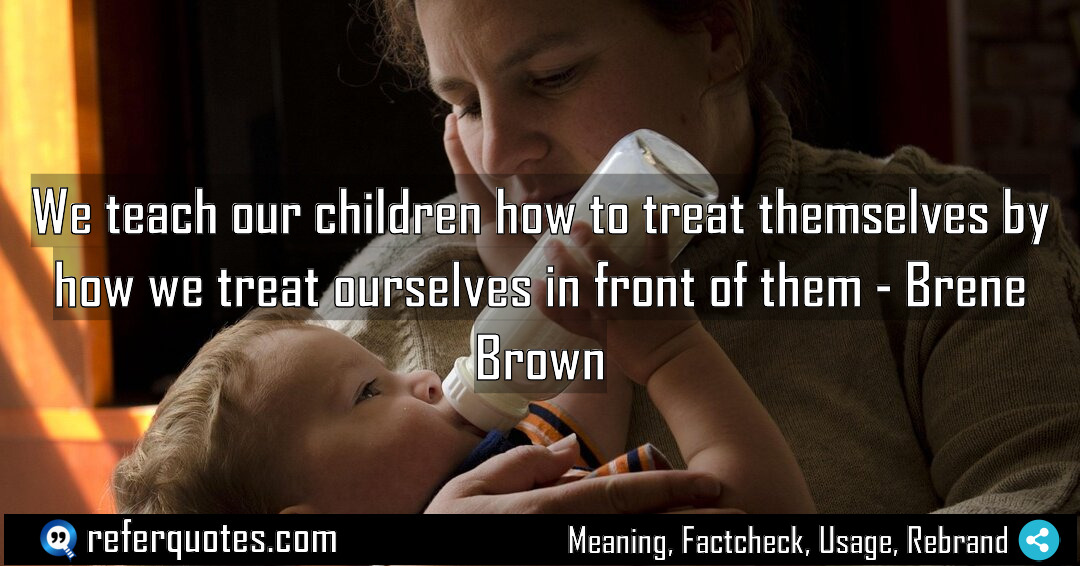
We teach our children how to treat themselves… not just with our words, but with our actions. It’s a powerful, and honestly, a little terrifying, concept that our own self-talk becomes their inner voice.
Share Image Quote:
Table of Contents
Meaning
The core message here is that our kids absorb our relationship with ourselves, and that becomes the blueprint for their own.
Explanation
Let me tell you, this is where the rubber meets the road in parenting. It’s not about the big “talks” we give. It’s about the micro-moments. It’s what happens when you look in the mirror and sigh, “Ugh, I look terrible today.” Or when you make a mistake and mutter, “I’m such an idiot.” Your child is right there, a little sponge, internalizing that this is how you talk to yourself when you’re disappointed. And the flip side? When you practice self-compassion, when you say, “Okay, I messed up, but I’m learning,” you are giving them permission to do the same. You are literally modeling the inner dialogue they will carry for life. It’s heavy, but it’s also incredibly empowering.
Quote Summary
Reading Level47
Aesthetic Score72
Origin & Factcheck
This quote comes directly from Brené Brown’s 2004 book, Women & Shame: Reaching Out, Speaking Truths, published in the United States. It’s a foundational concept from her early research and is often mistakenly attributed to other parenting experts, but the insight is pure Brené.
Attribution Summary
Author Bio
Dr Brene Brown is the author of books such as Daring Greatly and The Power of Vulnerability. The TED talk and Netflix production based on her research reached out to millions of audience. She researches effects of courage and vulnerability in shaping people's work and relationships. She leads the Brené Brown Education and Research Group and provides evidence-based insights into practical tools to help people train themselves
Official Website |Facebook | X | Instagram | YouTube |
Where is this quotation located?
| Quotation | We teach our children how to treat themselves by how we treat ourselves in front of them |
| Book Details | Publication Year: 2004; (other edition details unknown) |
| Where is it? | Approximate page from 2004 Hazelden edition, Section: Parenting and Shame |
Context
Brown places this idea squarely within her research on shame. She argues that we can’t teach children to be resilient against shame if we are constantly modeling self-critical, shame-inducing behavior in our own lives. The book is a call for women, in particular, to examine and change their own self-talk as an act of generational healing.
Usage Examples
This isn’t just theoretical. I use this with clients all the time.
- For the Perfectionist Parent: I tell them, “Let your kid see you try a new recipe and burn it. And then let them hear you laugh it off and order pizza. You’re teaching them that their worth isn’t tied to perfect performance.”
- For the Self-Critical Professional: I’ll say, “When you’re working from home and you mutter about being ‘so stupid’ for a typo in an email, your kid is in the next room learning that mistakes deserve self-punishment. Try narrating a fix instead: ‘Whoops, missed that. Let me correct it and send a quick follow-up.'”
- For Anyone Setting Boundaries: “When you say, ‘I’m too tired to help with that right now, I need to rest,’ you are teaching your child that it’s okay to honor their own limits. That’s a profound lesson in self-respect.”
To whom it appeals?
Share This Quote Image & Motivate
Motivation Score79
Popularity Score74
Shareability Score75
FAQ
Question: Does this mean I can never be frustrated or have a bad day in front of my kids?
Answer: Absolutely not. That’s not realistic. The goal is to model how you handle frustration and bad days. It’s the difference between a meltdown and saying, “Mommy is feeling really overwhelmed right now, so I’m going to take five deep breaths to calm down.” That’s a powerful lesson in emotional regulation.
Question: I have terrible self-talk habits from my own childhood. Is it too late to change this for my kids?
Answer: It is never, ever too late. In fact, the most powerful thing you can do is be transparent about the work. Saying, “You know, I used to be really hard on myself, but I’m learning to be kinder,” is maybe the best lesson of all. You’re modeling growth and change.
Question: What’s the single most impactful thing I can start doing tomorrow?
Answer: Pay attention to your language about your body and your capabilities in front of them. Replace “I’m so fat” with “I’m grateful my legs are strong and can carry me.” Swap “I can’t do this” with “This is really challenging, I’m going to keep trying.” This small shift changes everything.
Similar Quotes
You know, when Brene Brown said “Children learn who they are by watching how we treat ourselves,” she really nailed something profound. It’s not just about the direct lessons we…
You teach others how to treat you… and it’s one of the most powerful, and often overlooked, truths in personal and professional development. It’s not about being aggressive; it’s about…
Children learn who they are by how we respond. This simple idea from Marshall Rosenberg completely reframes parenting. It’s not about rewards or punishments, but about how we mirror their…
You know, that idea that “Our goal is not to make children obey…” completely reframes parenting. It’s not about control, it’s about connection and fostering genuine understanding. It shifts the…
When we respond with empathy, we give our children something profound: permission to be human. It’s a simple but radical shift that transforms parenting from correction to connection, and honestly,…
